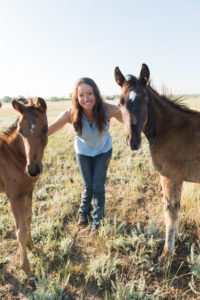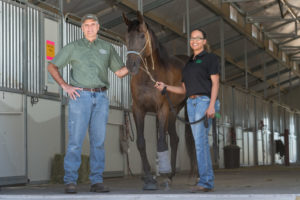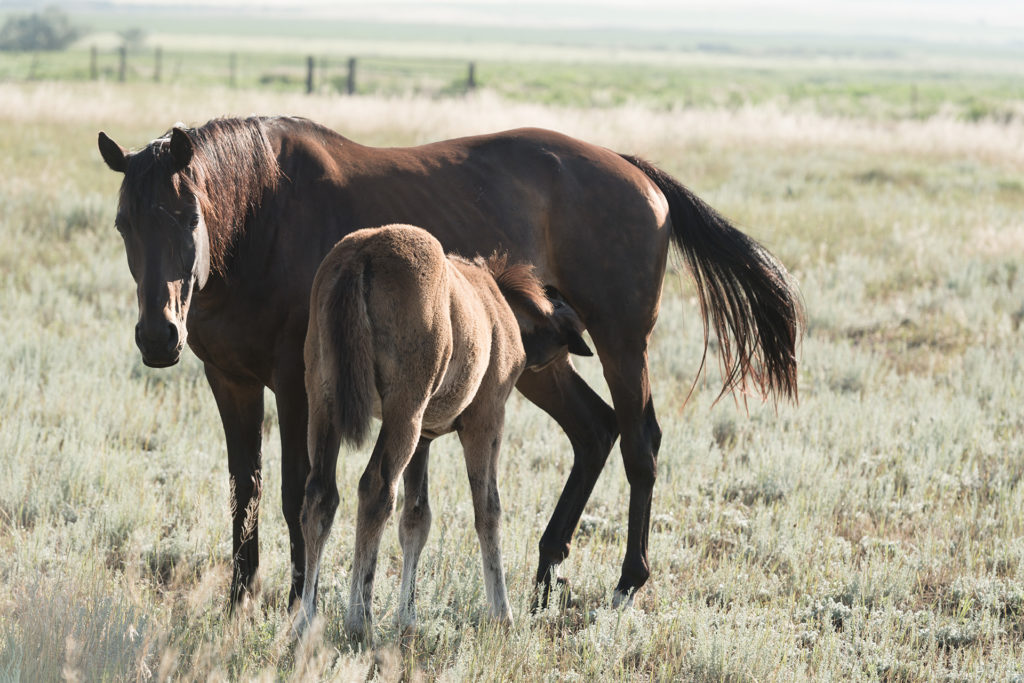
“I believe that what goes around comes around,” says Thea Cross, an equine trainer at Black Bluffs Equestrian Center in Nebraska, as she walks across a pasture to check on two foals. “Everything I’ve built is for these foals. I believe that dreams come true and legacies live on.”
Shotgun and Donut represent the intertwined legacies of Excess Karma, a horse that lived with a prosthetic leg for six years, and Cross’s father, Dr. Robert Cross, who graduated from veterinary school at Colorado State University in 1964 and practiced veterinary medicine in Wyoming until he had an unexpected heart attack in 2012.
“Dad would do anything for an animal,” Cross says. “All-nighters, sleeping in stalls with animals, waking up at 2 in the morning to go on a call. The animal was always first.”
Cross was in Wyoming making funeral arrangements when she learned that her favorite horse, Excess Karma, had badly injured her left front leg by dropping through an underground culvert.
“They asked what I wanted to do,” Cross says. “I knew that I had to do everything I could for her. I couldn’t lose both my father and Karma. It was a really hard day.” Cross, wanting to continue her father’s legacy, felt a responsibility to love and protect her horses however she could.
Cross took Karma to Ted Vlahos at Sheridan Equine Hospital in Sheridan, Wyo. Karma was a good candidate for a prosthesis. Dr. Vlahos performed amputation surgery on Karma’s leg the next day and fitted her for a custom prosthetic device.
Against all odds
Karma lived with her prosthetic leg for six years. At the end of 2016, her health began to decline. Cross called equine reproduction expert Dr. Patrick McCue at the Colorado State University Equine Reproduction Laboratory in early 2018 to discuss breeding Karma.
“’The mare has a prosthetic leg.’ That’s all I heard on the initial phone call,” McCue says. “The challenge became a bit more daunting when we were informed that the semen was frozen and limited to two doses, and that the owner wanted to use her own horses as the recipients of embryo transfers.”
Equine Reproduction Laboratory veterinarians track the reproductive cycle of their recipient mares, or surrogate horses that carry another horse’s foal, to ensure precise timing for embryo transfer. Timing is everything, and can result in better odds of the recipient mare becoming pregnant. The CSU equine team had not tracked the ovulation of Cross’s mares before, meaning McCue and his team had to hope Cross’s mares were in heat at the same time as Karma. Furthermore, frozen semen often results in a lower pregnancy rate when compared to unfrozen semen.

McCue was unsure whether Karma, whose condition was worsening, was even capable of becoming pregnant, but he wanted to try. The never-say-never attitude is true to his resolute and caring disposition. “We all felt like we needed to try to help Thea,” McCue says.
Cross brought Karma to the Equine Reproduction Laboratory on April 26, 2017, and an exam revealed the 10-year-old horse remarkably had normal reproductive function. McCue and his team worked quickly and patiently with Karma over the next three weeks. She was a unique patient who required prosthetic cleaning and dressing daily from a team of staff led by then-resident Dr. Melissa Prell.
“It was a very hands-on case,” says Prell, who is currently working at an equine reproduction center in Florida. “We were changing out the prosthetic every day or every other day, cleaning out the stump, and did all her ultrasounds in her stall so she wouldn’t have to move.”
McCue remembers Prell doting on the horse, grooming her and giving her extra time and attention. “Dr. Prell took this horse on as kind of her own,” McCue says. “We all owe Dr. Prell a huge thank you.”
Ultimately, the CSU team produced three successful embryos ready to transfer to Cross’s recipient mares. By the end of May, Cross had two pregnant recipient mares carrying Karma’s foals.
Three weeks later, Karma was gently and humanely euthanized, surrounded by her eight-member care team from CSU. “We walked Karma out of her stall, doted on her, groomed her, said our goodbyes,” McCue says. “It was very quiet, and she was surrounded by people who loved her.”
Cross finds peace in knowing she did everything she could for the horse that gave her all. “Love is very painful. I tried to give her the best life I could until I couldn’t anymore,” Cross says. “I wanted to carry her legacy on, and then let her go.”
Age of miracles
“Love let Karma go, brought sorrow and an end to a story,” Cross said. “But, love also brought new beginnings.”

Karma’s first foal, Shotgun, was born April 28, 2018. He was a big, healthy bay colt. Two weeks later, the second recipient mare delivered, but the foal was unable to nurse. The malnourished colt was so underweight that each rib protruded. He had trouble holding his head up, and showed signs of oxygen deficit to his brain.
“I tried to get him up and going, but he wouldn’t,” Cross says. “I called Dr. McCue and he told me I had better be on the road.”
Cross immediately drove the new colt three hours to the Equine Reproduction Laboratory. After an initial exam, Dr. McCue recommended Cross take the foal to CSU’s James L. Voss Veterinary Teaching Hospital for specialized care. Upon arrival, Dr. Yvette Nout-Lomas discovered that the new colt suffered from neonatal maladjustment syndrome, resulting from the inadequate transfer of nutrients and oxygen from the mare to the foal during gestation.
“This delay in the first critical hours to days puts these foals at a great risk for developing other life-threatening issues,” Nout-Lomas says.
Nout-Lomas and the equine team treated the foal with IV fluid therapy and anti-inflammatory medication, as well as a feeding tube and plasma transfusion. All the while, McCue held the colt in his lap. The colt remained in the hospital for one week until he recovered and returned home with Cross.
“He’s doing great,” Cross says. “He’s independent but likes hanging out around people. I think it’s because he was around people so much when he was born.”
Cross, who trains performance and show horses, has big plans for her two colts. The semen used in the embryo transfer comes from a talented Australian stock horse who played polocrosse and has won in campdrafting, cutting, and reining.
“The dream is to have a universal horse for campdrafting, cutting, reining, jumping, polo, and polocrosse. I think that’s what Karma’s foals are, dreams coming true,” Cross says. “I want to see these colts grow, and see how far they can go and the amazing things we can do together. We always need to go all in on following dreams, and some dreams take lifetimes to conquer. Love the journey, love the dream and always love the horse.”
It’s a big dream, but Karma is on her side.